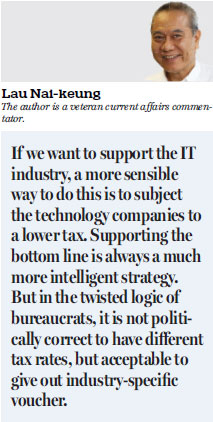Tax incentives are better than offering vouchers
Updated: 2017-02-28 06:11
By Lau Nai-keung(HK Edition)
|
|||||||
'To me, the budget is not just a collection of cold hard figures. It also indicates the priorities set by the government in resource allocation, reflecting the values we hold," Financial Secretary Paul Chan Mo-po said when he announced the budget on Feb 22.
These are very exciting words which got me all worked up.
Then came the "bucket list" that sounds like the Community Chest in the game of Monopoly. Income tax refund - Collect $20. "Mr Monopoly faints back against a man displaying the refund paper." Candies after candies are handed to taxpayers. Everyone is satisfied.
One of the most liked features in Paul Chan's budget is the widening of tax bands - a courageous move of Chan because it is "recurrent". It is not like this measure is original - the last time the tax bands were broadened was in 2008, by his predecessor John Tsang Chun-wah. But we like the fact that the tax bands are finally catching up with the growing income gap.

Tellingly, Chan also undid Tsang's policy of depositing part of the annual surplus into a Future Fund he set up in 2015. Instead of saving the surplus for unspecified uses, Chan said this year he will spend HK$61 billion, or 65 per cent of last year's surplus, on services for the elderly and the disabled, sports, innovation and technology and youth development.
Admirable as these are, the support measures for the elderly and the youth are peripheral to the real needs of our society. Hong Kong will thrive only if our working men and women do well. For this we need an environment which is conducive to small businesses and innovations. If our model works and that our working adults are happy, we know what direction we can direct our young people toward. If it does not work, we might as well save the money for the Future Fund until we figure out what to do with it.
The most visionary part of Chan's budget is his proposed review of the city's tax system. He mentioned three specific areas where work needs to be done - to align tax practices with international standards; to study ways to foster the development of industries through tax measures; and to broaden the tax base so as to ensure sustainable development.
Among the three tasks, the second is the most controversial in Hong Kong - the first is boring and the third has been mentioned at least in the form of a General Sales Tax not so long ago. Chan has in essence called for an industrial policy. This is a radical break from traditional wisdom - where bureaucrats picking winners is seen as unimaginable.
This formidable task of reviewing our tax policy is unlikely to be completed by the outgoing government. So far, none of the Chief Executive contenders making a bid for the city's top job have invited Chan to join their cabinet if they win. We hope that the incoming CE will continue to support the review.
No matter what the outcome, Chan should be honored and remembered for noting that the city needs an industrial policy.
Providing tax incentives or concessions to individual industries sits oddly with our long-held principle of providing a level playing field for all, but we are already doing this. The newly launched Technology Voucher Programme (TVP) is a form of incentives that will benefit the IT industry, but it is awkward and inefficient.
If we want to support the IT industry, a more sensible way to do this is to subject the technology companies to a lower tax. Supporting the bottom line is always a much more intelligent strategy. But in the twisted logic of bureaucrats, it is not politically correct to have different tax rates, but acceptable to give out industry-specific voucher.
In any case, the global competitive environment is changing fast. Investment goes to places where costs are low and profits are high. Given the government's drive in the development of the innovation and technology sector, it is in the city's best interests to consider providing more tax incentives to attract investors.
(HK Edition 02/28/2017 page7)